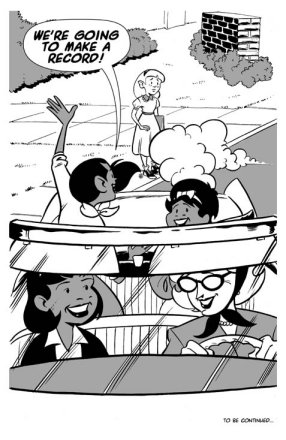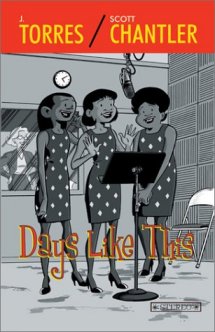| Days Like This
I'm not
a music buff.
I don't
anxiously await the release date of the newest album from
whatever pop-diva or boy band happens to be the flavor of
the month. I don't hitch my wagon to one metal band and spend
the rest of my life touting the genius of blaring guitar styles
or hard driving drum work. In all honesty, my CD "collection"
tops out at about 25.
It's not
that I don't like music: the CDs I do have, I enjoy greatly
and listen to them over and over. But unless something special
catches my attention, I tend to just not care what is coming
out at my local record store (if such a thing still exists
in these days of the Wal-Mart/Target monopoly).
Perhaps
this lack of musical interest on my part makes me dislike
J. Torres' and Scott Chandler's foray into the 1960s music
industry, Days Like This. Then again, it might be the
bland storytelling, unemotional characters, and overall pointlessness
of the book.
Dana has
just divorced her husband, Abe Solomon, and divested herself
from his company Aben Music. With her hefty divorce settlement,
she is planning to start up her own record company. Across
town, Christina, a young girl with dreams of singing and winning
her school's talent show practices with her friends for said
event. When they perform, who should hear them but Dana, sitting
in the audience with her daughter.
Almost
as soon as they jump off the stage, Dana has offered to sign
them to her new label and the rest of the book is how they
create an album, come up with a name, and finally grab that
fifteen minutes of fame on national television.
If you're
bored now, try slugging your way through the whole comic.
Torres gets points for trying for an original setting that
has rarely been portrayed in comics (that of the music industry
in the 1960s), but he fails to ever make the story interesting.
 Perhaps
his failing comes from the complete lack of conflict in the
book, which is odd considering his two main protagonists are
points of interest in the 1960s: Christina is a young black
woman, still in high school, during the civil rights movement
and Dana is a divorcee back when it was still seen as highly
unfashionable to be so. Perhaps
his failing comes from the complete lack of conflict in the
book, which is odd considering his two main protagonists are
points of interest in the 1960s: Christina is a young black
woman, still in high school, during the civil rights movement
and Dana is a divorcee back when it was still seen as highly
unfashionable to be so.
Granted,
the book is set in a thriving New-York-like metropolis and
therefore is assumed to be far more open to the "modern"
and different life styles, but couldn't we have seen a somewhat
realistic depiction of the times? No one looks down on Dana
for being divorced. No one seems to notice that Christina
and her friends are even of a different ethnicity. How about
some conflict J.? What the hell am I reading this for if there's
no build to a climax or a resolution to a conflict or problem?
Torres'
characterization is weak too, but he does have some nice moments
involving Christina's father's rejection of her music career,
Dana's daughter and her feelings of abandonment after the
divorce, and…. no one else.
Also,
Torres seems to just throw ambient plotlines in just in case
the main story didn't really interest anyone (which it didn't).
These plotlines aren't really resolved so much as cut off,
or abruptly stopped. The subplot of Abe owing money to the
mob: explained away in a few word balloons of dialogue. The
possible romance between the singing group's songwriters:
never touched on more than once. And even the intentional
subplot of Dana's daughter feeling abandoned is never really
addressed other than briefly by the mother, who's solution
is to take her out for ice cream and to go see her dad. It's
just shoddy storytelling.
I feel
sorry for Scott Chandler, whose art I find quite enjoyable.
He has a very cartoonish style. It's simple, with characters
sporting dot eyes and such, but he also has a fine eye for
the details of machinery, buildings, and his backgrounds.
His artwork fits the setting of the piece very well. The only
thing about his art that I didn't like was that some of his
ears appear too pointed (Christina's little brother being
the most afflicted party). I was waiting for Legolas to pop
out of a closet and shoot an orc through the eye. But that's
just my own stylistic preference and has no effect on the
overall look of the comic.
Ultimately,
Days Like This is almost completely devoid of worthwhile
content (it's like a nicely wrapped empty box). For the $8.95
you would pay for it, you could pick up three single issues
of comics that would have more story, better characters, and
maybe even a satisfying conclusion.
Check
elsewhere on the site for recommendations
for said single issues, as our reviewers generally know what
they're talking about. Except when recommending JLA/Avengers:
I read Marvel Vs. DC. Let it never happen again.
As
always, the opinions expressed here are those of Mr. Sparling,
and not necessarily those of Fanboy Planet. We buy our CDs
at Amazon.com and we enjoyed JLA/Avengers. It's a shame this
is his last column for us.
|

 Perhaps
his failing comes from the complete lack of conflict in the
book, which is odd considering his two main protagonists are
points of interest in the 1960s: Christina is a young black
woman, still in high school, during the civil rights movement
and Dana is a divorcee back when it was still seen as highly
unfashionable to be so.
Perhaps
his failing comes from the complete lack of conflict in the
book, which is odd considering his two main protagonists are
points of interest in the 1960s: Christina is a young black
woman, still in high school, during the civil rights movement
and Dana is a divorcee back when it was still seen as highly
unfashionable to be so. 




